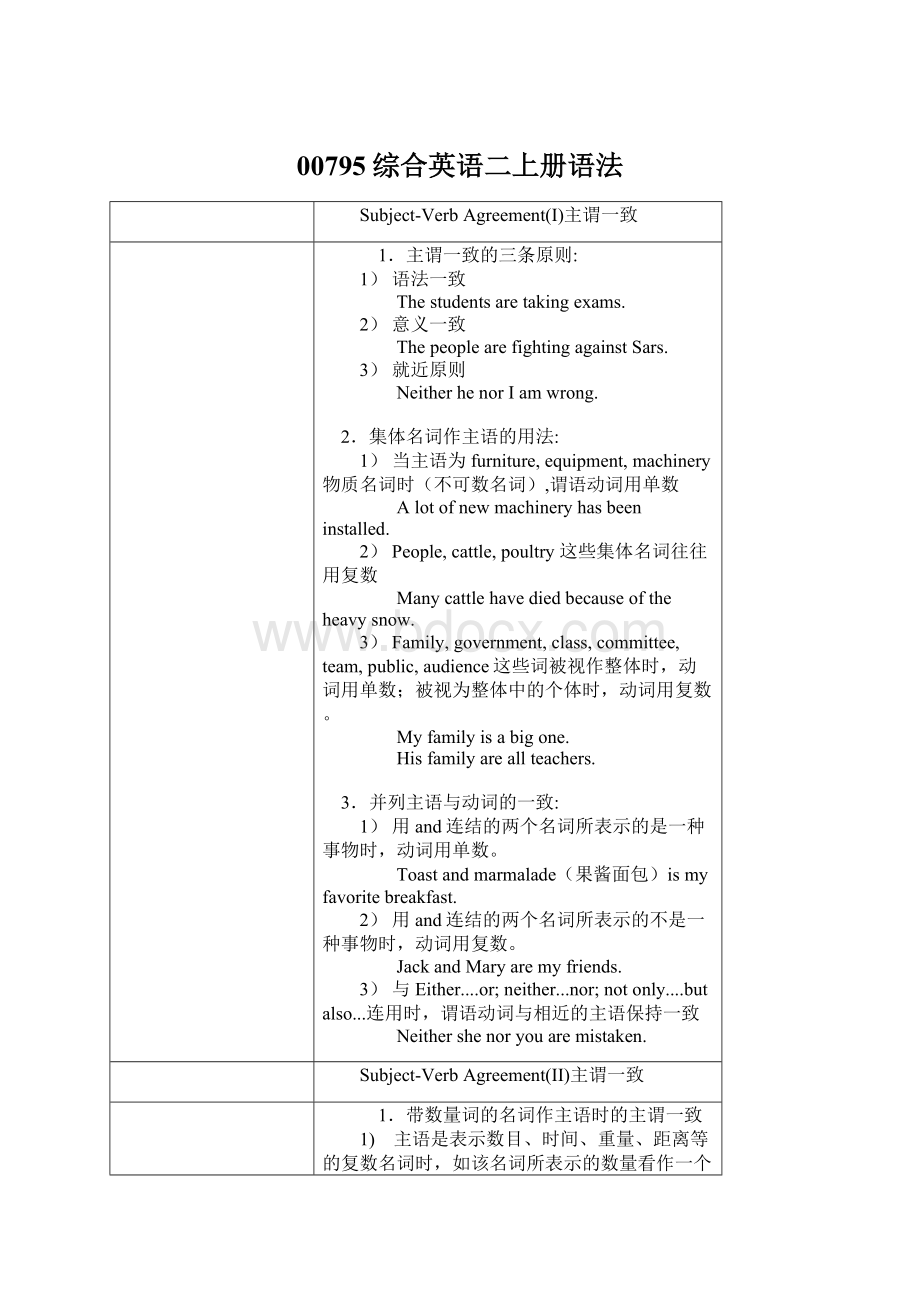00795综合英语二上册语法Word文档格式.docx
《00795综合英语二上册语法Word文档格式.docx》由会员分享,可在线阅读,更多相关《00795综合英语二上册语法Word文档格式.docx(32页珍藏版)》请在冰豆网上搜索。

Thepasttenyearswerethehardesttimeinherlife.
Hundredsofcarsarecrowdedontheroad.
3) 当主语为"
分数或百分数+of+名词"
时,谓语动词根据of后面的名词的单复数形式来定。
Three-fourthsofthestudentsarefromthesouth.
Two-thirdsofthestudentsinourclassareLeagueMembers.
Morethan70%oftheearth'
ssurfaceiswater.
Fortypercentofthelandisnotfitforfarming.
Thirtypercentofthebooksintheshelfareonhistories.
4) sheep,deer,fish,aircraft,means,works(著作,工厂)等单数与复数同形的词时,谓语动词的形式以名词单、复数的意义为准。
Asheepisinfrontofthehouse.
Manysheepareonthegrassland.
AgreatworksofMarxwaspublishedhundredsofyearsago.
Twomedicalworkshavebeenbuiltinthisarea.
2.all的主谓一致
1)代词
all与可数名词连用时,谓语动词用复数形式。
与不可数名词连用时,谓语动词用单数
Allofthemhaveseenthefilm.他们全都看过这部电影。
Allwhohavefinishedtheirhomeworkareallowedtogohome.所有完成作业的可以回家了。
Allhasbeengoingonwell.
一切进展顺利。
Allthatglittersisnotgold.
闪光的不一定都是金子。
2)形容词all与可数名词连用时,谓语动词用复数形式。
AllroadsleadtoRome.条条大路通罗马。
Allthepeopletakingpartinthemeetingarethemanagersfromdifferentdepartments.所有参加会议的人都是各部门经理。
AllworkandnoplaymakesJackadullboy.只工作不娱乐会使杰克变成呆孩子的。
Notallfoodisgoodtoeat.不是所有的食物都好吃的。
3.与none连用的词组作主语时,其谓语动词既可用单数也可用复数。
Noneofyouhave/hasreadthebook
Noneofusis/aresurewhetherhewillcomeornot.
Noun-PronounAgreementNoun-PossessiveCaseAgreement
名词与代词以及名词所有格的一致
1.名词与代词和名词所有格的一致
一般来说,代词和名词所有格对名词的指代在数的形式上是一致的。
Americans
donotassess
their
visitorsinsuchrelaxedsurroundingsoverprolongedsmalltalk.
美国人不会在这种轻松的环境,通过长时间的闲聊来评价他们的来访者。
Thetwosisters
have
owndifferenttoys.
Themen
arediscussing
opinionsatthemeeting.
Mr.AndMrs.Smith
aremygoodfriends.
They
arecomingtodinnertonight..
Theyweretalkingabout
oneof
thegirls,butIdidn'
t'
know
her
atthattime.
当名词为audience(观众),
class,
committee,
enemy,
family,
faculty院、系,
gang帮,
government,
jury陪审团,media媒体,
public公众,staff员工,team等既可视为整体名词又可视为个体名词的集体名词时,则要根据它们在句中的意思来确定代词和所有格的形式?
Thepublicdemandedthat
thegovernment
accountforitsneweconomicpolicy.公众要求政府解释它的新经济政策。
Thegovernment
haddiscussedthisproblemforalongtimebut
they
hadshownnosignofagreement.政府各部门对这个问题讨论了很长时间,但他们还没有达成一致的迹象。
Everyfamily
has
its
ownproblems.家家有本难念的经。
TheJohnsonfamlily
arealwaysquarrellingamong
themselves.约翰逊一家人之间总是吵架。
Everyclass
mayorganizeoutingson
own.每个班都可以自己组织郊游。
Theclass
arereadingveryattentively.
Their
eyesareallfixedontheirbooks.这个班的同学们在认真看书。
他们的目光都盯在书上。
Nowadays
thepublic
generallyadmiresthesuccessful.
Its
sympathyforfailuresisskin-deep.当今公众一般敬仰成功者,而它对失败者的同情却是表面的。
When
found
weredeceivedbythemedia,
angerwasbeyonddescription.当公众们发现他们被媒体欺骗了的时候,他们的愤怒无法形容。
2.不定代词的问题
one,
everyone,
everybody,
noone,
nobody,
anyone,
anybody,
someone,
somebody等作主语时,在正式的文体中其相应的代词一般用
him,所有格用his,也有人用
himorher和
hisorher。
If
anybody
asksforme,pleasetell
him
tocometomyoffice.
Everybody
mustfinish
his
homeworkbytomorrow.
Nobody
inthatpositionwillgive
opinionrightaway.
in
rightmindwoulddoanythinglikethat.
注意:
one作主语时,其相应的代词也可以是
one,所有格可以是
one'
s。
One
hastobecarefulaboutwhat
one
saysbeforechildren.
在非正式文体中,也可根据意义,用复数代词。
而且,由于
him和
his有语言性别歧视之嫌,虽然谓语动词仍用单数形式,现在人们普遍用复数代词。
Almost
everyone
usesthetelephonetosay
their"
Thankyou'
s."
Someone
hasleftanoteonmydesk.Would
pleasecometomyofficeafterclass?
leftthecinemainthemiddleofthefilm.Wasitbecause
werenotinterestedinit?
Noone
hashandedin
paperyet.
Everyone
hasgiven
opinionontheissue.
但everything,anything,
something,
nothing作主语时,其相应的代词要用单数形式。
Something
hasgonewrong,hasn'
t
it?
Everything
isready,isn'
it?
TagQuestions附加/反意疑问句
1.附加疑问句的构成
由两部分构成:
陈述句+附加成分。
附加成分也由两部分构成:
助动词或be的一种形式+人称代词(应与陈述句的主语相应)
附加疑问句主要用于口语,表示期望对方的同意或对所陈述之事的首肯。
附加疑问句有下列几种形式:
1)肯定陈述句+否定附加成分(附加成分除极为正式场合或老式英语中都要用缩略形式)
Maryishere,isn'
tshe?
Snydersaid,"
Takeover,bos'
n,"
didn'
the?
Yousuregettoseethingsdifferently,don'
tyou?
You'
veheardthenews,haven'
Hegaveyouthebook,didn'
he?
Peterhadfinishedtheletterbeforeyoucame,hadn'
dratherIdidn'
tsayanything,wouldn'
Jackusuallyhasteaforbreakfast,doesn'
2)否定的陈述句+肯定附加成分
Peterdoesn'
tsmoke,doeshe?
Thepartywon'
tstartuntilseven,willit?
Davidwouldn'
tbeinthispositionifheworkedintheindustry,wouldhe?
Peopleshouldn'
tlitter,shouldthey?
Youhaven'
tbeenherebefore,haveyou?
Hedidn'
tswitchoffthegas,didhe?
2.附加疑问句的几点特殊用法
1)凡是带有no,none,noone,nobody,nothing,hardly,seldom,rarely,never,barely,few,little,neither等否定词的陈述句,都应看作否定陈述句,后面接肯定附加成分
Sheseldomleavestheroominwinter,doesshe?
Peoplerarelygothatfartothatsmallvillage,dothey?
Therearefewstudentsintheclassroom,arethere?
Hecanhardlyread,canhe?
2)当陈述句的主语为everybody,everyone,someone,somebody,anyone,nobody,noone,neither,none时,附加成分中的代词一般用
they。
Everyoneatthepartyhadagoodtime,didn'
tthey?
Neitherofthemsaidaword,didthey?
Noneofthebooksarereturned,arethey?
3)陈述部分是there
引导的存在句时,附加成分由助动词或be
的一种形式+there构成。
Thereissomethingwrongwiththechild,isn'
tthere?
Thereisnobodyintheroom,isthere?
4)陈述部分是肯定的I'
m...
结构时,附加成分为aren'
tI
。
I'
mthedoctor,aren'
tI?
mlate,aren'
tI?
(在老式或极为正式的英语中:
Iamlate,amInot?
)
5)陈述部分是一个带有
that从句作宾语的主从结构时,附加成分应与主句的主语和谓语动词保持相应关系。
Youthink(that)Ididit,don'
tsayMarywouldcome,didhe?
当陈述部分的主句是Ithink,IsupposeIbelieve等时,附加成分往往与
that从句中的主语和谓语动词保持对应关系,但要注意Idon'
tthink等结构对从句的否定用法。
Isupposeyouareheretostudy,aren'
Idon'
tthinkhecameherejusttosaygoodbye,didhe?
Ibelieveyouareinurgentneedofhelp,aren'
如果想核实对方的看法是否与你一致,附加部分则与主句相应。
Ithinkhe'
sthebestpersonforthejob,don'
6)在祈使句后加上一个附加疑问成分可缓和语气,附加成分一般用
willyou和
wouldyou,但也可用
won'
tyou
或can'
tyou.
Sitstill,won'
Openthewindow,wouldyou?
Givemeahand,won'
7)Let'
s
型祈使句中附加成分用shallwe。
Let'
sgoforawalk,shallwe?
sgetdowntowork,shallwe?
8)陈述部分带有usedto时,附加成分用
did形式,偶尔用
usedto
形式。
Heusedtosmokefiftycigarettesaday,didn'
有的语法书将usednot
缩略式定为usedn'
tto,这是老式的用法,现在很少人使用。
3.附加疑问句的回答
要针对所陈述的内容,不受附加疑问成分的制约。
--Youdidn'
tgotherealone,didyou?
你没有独自去那儿,是吗?
--No,Ididn'
t.是的,我没有。
--Youdon'
tlikethefilm,doyou?
你不喜欢这部电影,是吗?
--Yes,Ido.不,我喜欢
--Youlovecoffee,don'
你喜欢咖啡,不是吗?
--Yes,Ido.是的,我喜欢
TypesofSentence:
theImperative句子类型:
祈使句
1.祈使句的作用
1)表示命令和指示
Bequiet.
Stopshoutingoverthere.
Keepoffthegrass!
Shakethebottlebeforeyoutakethemedicine.
Don'
tmakeanynoise.
Lettheboysaywhathewants.
2)表示建议、劝告或警告
tworry!
Besensible.
Don’bbesilly!
Becareful.
tbeupset.
Writetomeifyouneedfurtherinformation.
3)请示和呼吁
Comequickly.Help!
Dohelpme,please.
Please,stopfighting.
4)邀请
Dropinwheneveryouhavetime.
Comeinandhaveacupoftea.
Pleasehelpyourself.
5)解释
TakeClass5forexample.
LookatthesituationintheMiddleEastforexample.
Considerthefollowingcase.
2.祈使句的基本形式
祈使句的第二人称主语you通常省略,以动词原形开头,句尾用句号或感叹号。
Sitdown.
Takeyourshareofthewater!
祈使句的否定形式是在动词前加don'
,但在正式文体中则用donot
tbesilly!
tpickyournoseinclass.
Donotlitterinthepark!
Donotfeedtheanimals!
也可在动词前加never。
Neverforgetthepast.
Neverputoffuntiltomorrowwhatyoucandotoday.
3.祈使句的委婉形式
1)在句首或句尾加please
Pleasespeakslowly.
Passmethesalt,please.
Pleasedon'
tforgettocomehereateighttomorrow.
tdothatagain.
2)用附加疑问成分willyou?
/won'
/wouldyou?
等。
Comeandhavedinnerwithus,wouldyou?
Takemetothetheatre,won'
tcomelateagain,willyou?
Listencarefully,willyou?
4.祈使句的强调形式
1)在动词前可加上助动词do。
Docomeinandhaveacupofcoffee.务必来喝杯咖啡。
Dotellmewhat'
sbotheringyou.一定告诉我有什么麻烦。
Dofinishyourhomeworkontime.务必按时完成作业。
Dobepolitetoyourcustomers.对顾客一定要有礼貌。
2)祈使句表示命令、建议或警告时,动词前加"
you"
Youshutup.住口。
Yougofirst.你先请。
Youbeatthesheriff'
sofficeatnoon!
中午到郡长办公室来。
5.祈使句的第三人称形式
祈使句